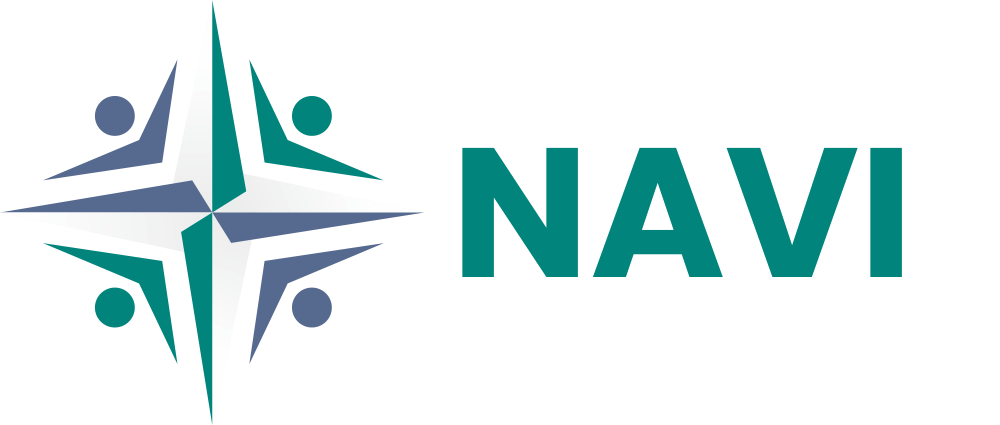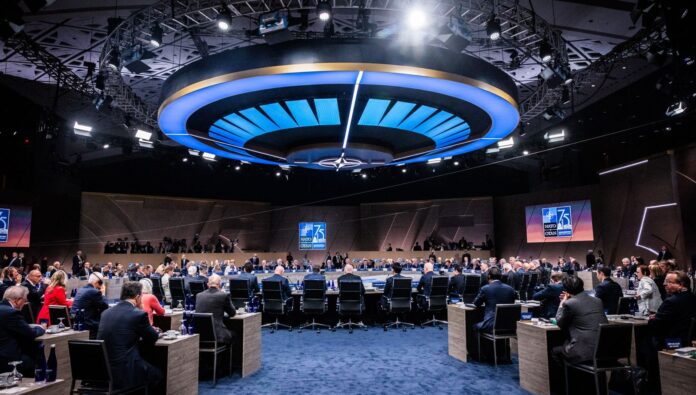Marking a significant milestone, the 75th anniversary of the North Atlantic Treaty Organization (NATO) was celebrated with a historic summit in Washington DC on July 10-11, 2024. This landmark event underscores seven and a half decades of unwavering collective security and solidarity among member states, highlighting NATO’s enduring commitment to defending democratic values and maintaining international peace. It highlights a critical assemblage of member states and relevant stakeholders in the security alliance. Reminding the member states, President Joe Biden highpoints that NATO emerged out of the wreckage of World War II, intending to promote collective defence among the democratic nations.
NATO is rooted in foundational principles and values that acknowledge that an attack on one member state equates to an attack on all allies. Such a forum creates an environment that officially welcomes the newly joined ally member states into the security architecture, including Finland and Sweden. The 32 ally members emphasised the need to rejig the fundamental ethos, enshrined in unity and solidarity, that guides the institution to confront contemporary global security challenges. As echoed by the Washington Summit Declaration “We stand in unity and solidarity in the face of a brutal war of aggression on the European continent and at a critical time for our security.”
The forum constructs an opportunity to reaffirm the core principles, values, and fundamental objectives of NATO, underscored by the current reality of global security threats and geopolitical tension. The call for absolute unity and cohesion unequivocally forms an essential narrative among the member states. The 2024 NATO summit is based on five unwavering agendas revolving around continuous support for Ukraine, fortifying deterrence and defence capabilities, partnering with industries to enhance production, enhancing the alliance’s partnerships, and ensuring allies’ members invest in collective defence and their national security.
Reflection from the Key Figures and Experts
As several political leaders and international security experts asserted their positions on NATO, their views are geared towards a sustainable future for the organisation. However, some narratives are central to the institution’s capability to withstand the current global security dystopia that has continued to skyrocket. The forum emphasizes the massive transfer of weaponry to Ukraine in its pursuit of defending itself from Russia’s invasion. While supporting Ukraine underscores the critical discourse in the forum, offering military assistance and resource mobilisation to defend itself against Putin’s aggression is fundamental to the forum’s central discourse. Insights from NATO’s Secretary General, Jens Stoltenberg, and U.S. Secretary of State, Anthony Blinken, emphasised essential support for Ukraine. The continuous military aid package and political cooperation centred on the noteworthy dialogue for Ukraine to defend itself against Russia’s hostility. Nevertheless, there are primary conditionalities for Ukraine’s future accession to NATO, such as enhancing its security architecture, democratic reform, and military interoperability becoming imperative. Evident from such military support, the pledge to transfer F-16 jets from the Netherlands and Denmark is instrumental in Ukraine’s defense against Russian belligerence. It is believed that such military assistance reinforces Ukraine’s capability, which is supposed to be displayed in the Ukrainian sky to deter Russian assault during this summer period.
The NATO agenda towards Ukraine aims to see the country triumph over Russia’s aggression. Winning the war requires making Ukraine politically, economically, and militarily independent. Economic support driven by private industries will enable Ukraine to build a robust economy and recover from the losses Russia has unleashed on the country. Winning Putin’s war necessitates accommodating Ukraine in the Euro-Atlantic institutions, including NATO and the European Union. Standing by Ukraine symbolises a synergy and cooperation that will be difficult for Vladimir Putin to challenge even in the post-war era. Air defence infrastructure is critical to private investment protection in Ukraine.
Additionally, the recent bilateral agreement between the United States highlights the commitment of the US to support Ukraine in defending itself. Moreover, Ukraine has policy aims to be independent democratically, economically, and militarily. As part of a substantial approach to empowering Ukraine to defend itself from Putin’s War, the establishment of NATO command and several other military assistance and humanitarian aid provisions rendered by European allies highlight some of the deepening solidarity for Ukraine. While Ukraine’s NATO membership constitutes a significant discourse during the forum, the inability to provide an exact timeline for its accommodation into the security bloc highlights one of the critical issues to be addressed in the near future.
Moreover, China has become Russia’s ‘decisive enabler’ in the Ukraine war. The allegation was made that China is strengthening Russia’s defence capability, which Beijing has repudiated. While China is building its outer space capability, NATO members have accused Beijing of utilising such a prospect to promote malicious cyber warfare and disinformation against them. The recent bond between Russia and North Korea reflects the polarity between civilized democratic nations and aggressors. It is against this background that Europe and North America have reinforced their commitment to the U.S. allies in Asia even though several allies maintain differing policies towards Beijing. Acknowledging the significance of Asia becomes essential due to its strategic importance in achieving NATO’s security agenda. The commitment of Indo-Pacific 4 (IP4), including the Republic of Korea, Australia, New Zealand, and Japan, highlight that the necessity to subdue authoritarian threats in the region is tantamount to their security.
Beyond 75th: The Rocky Terrain and Blurring Future
Emphasizing the need to incorporate private sectors into the NATO security agenda, it is believed that accommodating and leveraging technologies from such organizations will promote optimum outcomes in the international security landscape. However, to what extent can such private industries be housed and trusted, particularly regarding sensitive international security information? This remains one of the challenges that NATO may face to make such industries contribute to its collective security agenda. Moreover, to deal with transnational threats that surpass conventional warfare, NATO’s adaptability to non-traditional security challenges, including pandemics and biotechnologies, must be reinforced. Additionally, looking beyond the major power horizons, accommodating developing nations for NATO global coverage was considered to counter the global geopolitical game. Essentially, the crucial role of the young generation in NATO remains one of its vital pursuits, particularly in the leadership network.
Although NATO is referred to as “the most successful alliance in history,” it is contingent on the factors used in defining its success. Assessing the current NATO security ecosystem, NATO security architecture has demonstrated resilience in the changing global security scenery. Although the institution is adaptive to contemporary security challenges, future challenges that revolve around anti-NATO promotion by the political leadership of key member frontiers like the U.S. will likely impact the organization’s existence. Such a challenge entails the changing political leadership of its member states, particularly the United States.
One unavoidable issue is that NATO has to prepare for the uncertainty that will emerge in the post-November American presidential election, which would determine NATO’s future. As exhibited by Donald Trump’s recent speech, the U.S. can survive without the intervention of NATO. Such a narrative has laid credence on the isolationist tendency engrained in his political campaign, which may negatively impact the organization’s survival despite reassurances from the current American political administration.
This remains one of the critical issues the organization will face. One concern that dominates the anti-NATO campaign pushed forward by Trump is the uncertainty regarding whether the U.S. will join its allies if any of the NATO members are attacked. This remains a provocative issue that should be well thought out, especially considering the existential threat of such an agenda against NATO’s continuous subsistence. It is important also to remember that the famous Article V, which it still emphasizes that an attack on a member state equates to an attack on all member states, is not rocket science. Allies must reach a consensus on whether action should be taken against the aggressor. Such a fundamental decision is taken collectively by the allies.
However, such action will demonstrate non-interference if a member state disagrees, like the U.S., with the approval of Congress. Moreover, if the U.S. withholds its weaponry and upholds non-interference, the alliance will experience a defeat before taking off to the theatre of conflict. This is because the alliance heavily depends on the U.S. for crucial operational intelligence, missile defense, and air-to-air refueling, to mention a few. Without support and cooperation from the U.S., NATO cannot endure long-term combat. Without the U.S. nuclear umbrella, EU nuclear deterrence can only be sustained using the capabilities offered by France and Britain, which cannot be equated with the comprehensive coverage usually provided by the U.S. In this regard, the prospect of the NATO alliance transcends tackling contemporary security challenges. The changing political leadership of member states may impact the survival and sustainability of the organization.
Concluding Remarks
NATO plays a fundamental role in shaping the international security agenda. The organisation has continued to pursue collective defence of its member states. NATO has demonstrated strength, unity, and doggedness in responding to security challenges beyond its allies’ borders. Considering the ongoing war in Ukraine, the organisation’s relevance to tackling Putin’s aggression remains affirmatory.
However, despite the NATO allies pledging continuous military aid to Ukraine, the 2024 forum lacks a clear roadmap to end Russia’s aggression either through diplomatic pursuit or direct involvement in the war. It becomes imperative to interrogate NATO on how long Ukraine would depend on allies to defend itself against Putin’s war in Ukraine. One of the concerns of the 2024 Washington Summit is the lack of a comprehensive blueprint to promote sustainable peace beyond military aid provisioning. Moreover, another fundamental distress regarding the future of NATO lies in the changing political leadership among its key allies. For instance, if America’s commitment declines, changes, or withdraws from the alliance (although it requires a 2/3 majority of the Senate or an act of Congress) resulting from the changing policy of a new political administration, such action will have a dire consequential impact on the organisation.
Pulling out by any major power may push back the organisation’s strength in tackling global security challenges. Therefore, all allies must be unified in their pursuit to uphold the fundamental ethos engrained in Article 5 that promotes collective defence. Strengthening defence capabilities and collaboration with industries to enhance production requires collective efforts, including timely resource mobilisation, encouraging each ally to invest in its defence capability and partner with one another, and looking beyond overdependency on the alliance. Additionally, it is high time the organisation considered injecting the young generation into its leadership role by encouraging youths to participate in its innovative programs, which can be achieved through a quota system spread across member states. This will help generate new ideas that may pilot the organisation to address contemporary global security challenges. Finally, while boosting collective defence spending by allies would enable the organisation to achieve its stated goals, investing in individual member states national security remains crucial to complement the alliance’s effort.
Dr. John Sunday Ojo obtained a PhD from the University of Portsmouth in the United Kingdom. He earned a Master of Arts in Global Development from the University of Leeds in the UK and a Master of Science in Urban Management and Development with a concentration in Environment, Sustainability, and Climate Change from Erasmus University Rotterdam in the Netherlands. He also holds a BSc (Hons) in Local Government Studies from Obafemi Awolowo University in Nigeria. A wide range of issues are at the core of his expertise, including armed conflict, violent extremism, terrorism, counterinsurgency (COIN), counterterrorism, African affairs, and international security. He co-edited a book published by Palgrave Macmillan titled "Armed Banditry in Nigeria: Evolution, Dynamics, and Trajectories." Dr. Ojo's works have appeared in leading peer-reviewed journals, including Civil Wars, Democracy and Security, RUSI Journal, African Security, International Journal of Public Administration, Journal of Applied Security Research, and Conflict Resolution Quarterly, among others.

